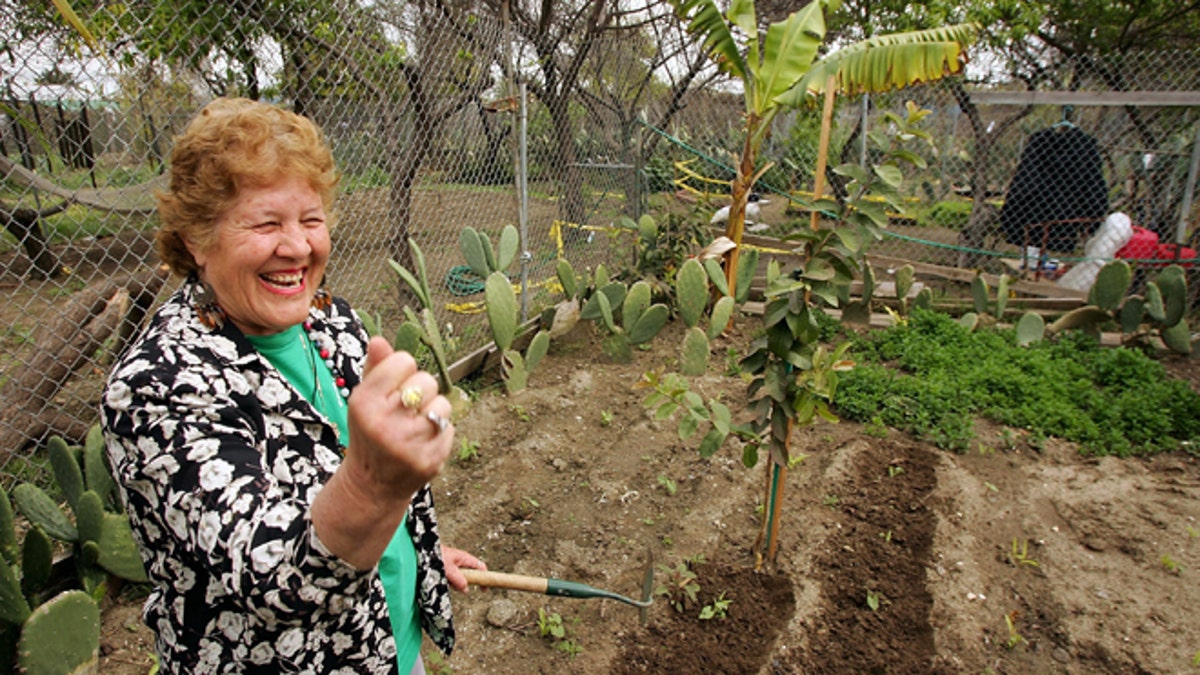
LOS ANGELES, CA - MARCH 09: Maria Gonzalez gestures as she expresses her love for her garden plot at the South Central Community Farm on March 9, 2006 in Los Angeles, California. Owner and developer Ralph Horowitz has decided to erect a Wal-Mart warehouse on the site and ordered the eviction of the farmers who won a stay until a March 13 hearing to determine the fate of the 13-year-old community food farm. The 14-acre food garden is operated by about 350 Mexican and Guatemalan immigrant families who mostly live under the poverty line and is reportedly the nation's largest urban farm. (Photo by David McNew/Getty Images) (2006 Getty Images)
It’s long been a mystery as to why Latinos in the U.S., who suffer from worse health, actually live longer than other groups. Researchers dub it the “Hispanic paradox,” and a new study gets down to the molecular level to try and apply the findings on the rest of humanity.
“The Hispanic paradox has been observed since at least 1986, and so for decades there was this debate of whether it was a result of various biases such as the healthy migrant effect or the so-called 'salmon bias' — meaning sick immigrants returned to their home countries shortly before death,” said Steve Horvath, lead author of the study published recently in the journal Genome Biology, to Fox News Latino.
“However, our study uncovered a smoking gun for a molecular advantage of Hispanics when it comes to aging rates.”
Horvath, a professor of human genetics at UCLA, said that one of the novelties in this study is that it used the “epigenetic clock,” whereas in the past all of the research was based on mortality.
“The epigenetic clock is the key to answering the question of what is aging,” said Horvath, who devised the method in 2013 to study changes to human DNA molecules that influence which genes are active, but don’t actually change DNA sequencing.
Horvath’s team studied 18 sets of data on DNA samples from 5,162 U.S. residents, analyzing blood, saliva and brain samples. Participants included black, white and Latinos, but also Han Chinese, two groups from Central America, and members of the Tsimane Amerindian tribe — an indigenous people from the lowlands of Bolivia.
Horvath’s biological clock measured Latino women’s age as 2.4 years younger than non-Latino women of the same age after menopause.
Indeed, the Centers for Disease Control and Prevention found that life expectancy rates for Latinos in 2014 were the highest out of any group studied — at 84 for Hispanic women and more than 79 for men.
When Horvath’s team examined the DNA from blood – which reveals the health of a person’s immune system – they were struck by differences connected to ethnicity. Specifically, scientists noted that, after accounting for differences in cell composition, the blood of Latinos and the Tsimane aged more slowly than other groups – Tsimane and Latinos are genetically linked.
Horvath explains that although DNA is fixed, there can be chemical modifications of the sequence – epigenetic changes. These changes play an important role to the aging process. It's the first study to look at these changes in ethnic groups and compare genders.
It's established that women in general live longer than men, but the study found that women also age more slowly, and that aging is accelerated in those with less education, and down slows with higher levels of education.
Horvath said that even though roughly 40 percent of aging is driven by genetics, epigenetic changes are highly susceptible to environmental changes — for example smoking and diet.
The bizarre finding is that despite the fact that by age 35 the Tsimane's immune system is shot and their inflammation levels are sky-high, the documented age of their blood is two years younger than Latinos and four years younger than Caucasians — all pointing back to the “Hispanic paradox,” and their molecular relationship to Latinos.
“It’s irrefutable that epigenetics play a role in aging, but not the only role,” Horvath said, adding that the most urgent thing next in his agenda is to perform the same test on organs and see if it shows the same delayed-aging effect.
“Once we do that, we find the molecular pathway and [figure out] which molecules could be manipulated by drugs,” he said, “and then mimic or amplify the part of the pathway that is beneficial to anti-aging.”
